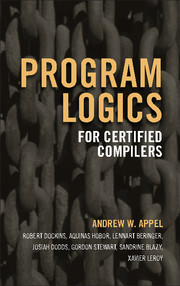Book contents
- Frontmatter
- Dedication
- Contents
- Road map
- Acknowledgments
- 1 Introduction
- I Generic separation logic
- II Higher order separation logic
- III Separation logic for CompCert
- IV Operational semantics of CompCert
- V Higher-order semantic models
- VI Semantic model and soundness of Verifiable C
- 40 Separation algebra for CompCert
- 41 Share models
- 42 Juicy memories
- 43 Modeling the Hoare judgment
- 44 Semantic model of CSL
- 45 Modular structure of the development
- VII Applications
- Bibliography
- Index
42 - Juicy memories
from VI - Semantic model and soundness of Verifiable C
Published online by Cambridge University Press: 05 August 2014
- Frontmatter
- Dedication
- Contents
- Road map
- Acknowledgments
- 1 Introduction
- I Generic separation logic
- II Higher order separation logic
- III Separation logic for CompCert
- IV Operational semantics of CompCert
- V Higher-order semantic models
- VI Semantic model and soundness of Verifiable C
- 40 Separation algebra for CompCert
- 41 Share models
- 42 Juicy memories
- 43 Modeling the Hoare judgment
- 44 Semantic model of CSL
- 45 Modular structure of the development
- VII Applications
- Bibliography
- Index
Summary
Indirection theory is a powerful technique for using step-indexing in modeling higher-order features of programming languages. Rmaps (Chapters 39 and 40), which figure prominently in our model of Verifiable C, rely heavily on indirection theory to express self-reference.
When reasoning in a program logic, step indexes are unproblematic: the step indexes can often be hidden via use of the ▹ operator, and therefore do not often appear explicitly in assertions. Indirection theory provides a generic method for constructing the underlying step-indexed models.
More problematic is how to connect a step-indexed program logic like Verifiable C to a certified compiler such as CompCert. CompCert's model of state is not step-indexed, nor would it be reasonable to make CompCert step-indexed. To do so introduces unnecessary complication into CompCert's correctness proofs. It also complicates the statement of CompCert's correctness theorem: naively requiring the compiler to preserve all step indexes through compilation makes it difficult to reason about optimizations that change the number of steps.
Previous chapters of this book outlined one way in which this difficulty can be resolved, by stratifying our models into two layers: operational states corresponding to states of the operational semantics used by CompCert, and semantic worlds appearing in assertions of the program logic. Chapter 40 in particular gave some motivation for why this stratification makes sense: We may not want all the information found in operational states to be visible to Hoare logic assertions (in particular, control state should be hidden).
- Type
- Chapter
- Information
- Program Logics for Certified Compilers , pp. 385 - 391Publisher: Cambridge University PressPrint publication year: 2014



